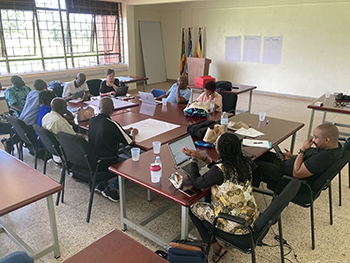The North-West University (NWU) continues to affirm its commitment to advancing community engagement through innovative research methodologies.
This commitment was recently exemplified at the African Centre for Training in Community-Based Participatory Research (CBPR) established by the United Nations Educational, Scientific and Cultural Organisation (UNESCO) Knowledge for Change (K4C) at Gulu University in Uganda.
It is here where the NWU showcased its dedication to integrating CBPR and indigenous knowledge systems (IKS) with its community engagement strategies. These efforts underscore the role of the NWU as a leader in fostering collaborative research that not only addresses local challenges, but also contributes to global knowledge.
Building bridges through collaborative research
At the heart of the community engagement initiatives of the NWU is the use of CBPR, a methodology that transforms the traditional research paradigm by actively involving community members in the research process.
CBPR ensures that research is not only about communities but also conducted with and for them, addressing their needs and aspirations. This collaborative approach is key to producing outcomes that are directly beneficial to the communities involved, ensuring that the research has a tangible, real-world impact.
The recent Gulu training provided an invaluable opportunity for the NWU to strengthen its commitment to CBPR. The training emphasised the importance of bridging the gap between academic research and practical applications, highlighting how CBPR can be a powerful tool for community empowerment and sustainable development. By fostering mutual learning between academics and community members, the NWU is enhancing the relevance and effectiveness of its community engagement activities, ensuring that they are responsive to the needs of the communities they serve.
Valuing indigenous knowledge for sustainable development
Another cornerstone of the NWU's approach to community engagement is the integration of IKS with its research and outreach efforts. IKS represents the collective wisdom and practices of local communities, rooted in their cultural heritage and long-standing traditions. By incorporating IKS into its research methodologies, the NWU not only enriches the research process, but also ensures that the solutions developed are culturally appropriate and sustainable in the long term.
The Gulu training highlighted the critical role of IKS in promoting sustainable development and preserving cultural heritage. The NWU's emphasis on IKS reflects a broader understanding that meaningful community engagement must respect and incorporate the
knowledge and practices of the communities involved. This approach not only honours the cultural identity of these communities but also enhances the sustainability of development initiatives by grounding them in locally accepted practices and beliefs.
Role in the global Knowledge for Change (K4C) Consortium
The participation of the NWU in the UNESCO K4C Consortium further solidifies its position as a global leader in community engagement. The K4C Consortium is a global partnership that seeks to address both local and global challenges through community-university collaborations. By being an active member of this consortium, the NWU is contributing to the co-creation of knowledge that is both contextually relevant and globally significant.
The Gulu Residential Training Programme, as part of the K4C initiative, provided the NWU with an opportunity to engage with other global partners in refining and expanding its community engagement strategies. This participation highlights the dedication of the NWU to fostering skills in community-based research, not only among its academics but also among community members. Through this global network, the NWU is playing a pivotal role in shaping the future of community engagement, ensuring that its initiatives are both innovative and impactful.
Commitment to real-world impact
The involvement of the NWU in the K4C Gulu Residential Training Programme is a testament to the university’s unwavering commitment to community engagement through innovative research.
By integrating CBPR and IKS into its strategies, the NWU is ensuring that its research efforts are not only academically rigorous but also deeply rooted in the needs and realities of the communities it serves. This approach not only bridges the gap between academia and the real world but also ensures that the university's community engagement activities have a lasting and meaningful impact.
The work of the NWU in this area is a powerful example of how universities can play a transformative role in society, contributing to sustainable development and global knowledge creation.
.jpg)
Opening day of the UNESCO K4C Residential Training Programme in Gulu, Uganda. Prof Openjuru L George, vice-chancellor of Gulu University, delivers a welcome address to the delegates, setting the stage for the collaborative sessions ahead.
.jpg)
Jeeva Munsamy from the Central University of Technology participates in an indigenous tree-planting ceremony during the training programme, symbolising growth and sustainability.
.jpg)
UNESCO K4C chairs and delegates enjoy an authentic traditional dance performance, celebrating the rich cultural heritage of the local community.
.jpg)
Dr Karen Venter from the University of the Free State receives a heartfelt gift from a young girl in the village.
.jpg)
Delegates outside the headquarters of the Global Institute of Applied Governance in Science and Innovations, led by Prof Catherine Hoppers.

Delegates engage in collaborative discussions, emphasising the integration of CBPR and IKS for sustainable community engagement and development.
